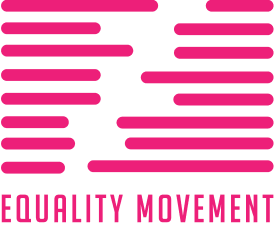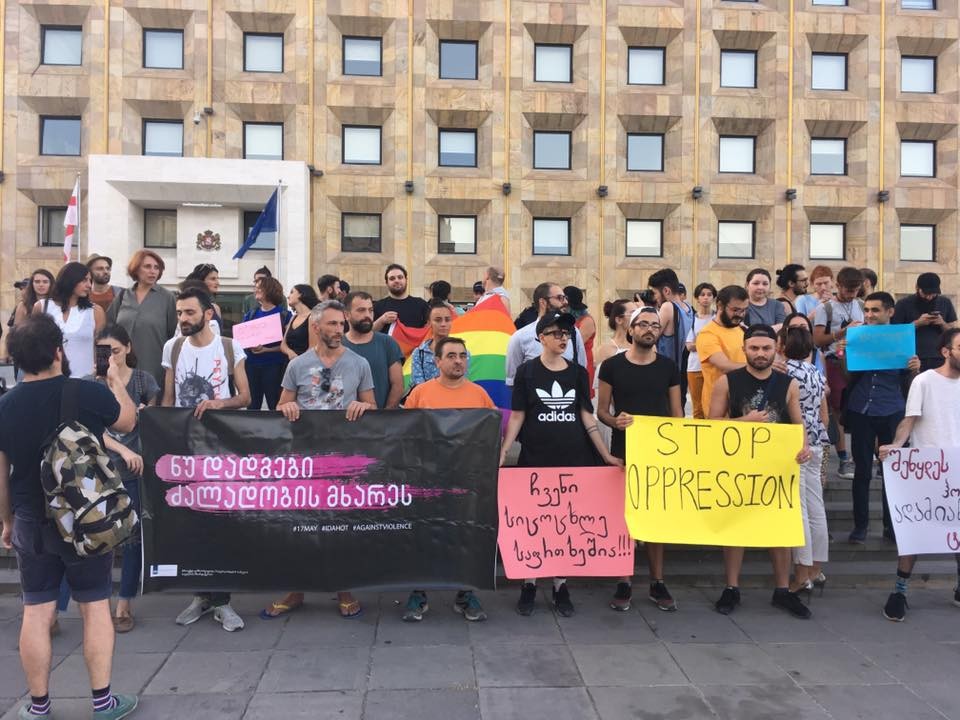Human rights NGOs and groups are extremely concerned about beating of the Equality Movement activists Levan Berianidze and Tornike Kusiani in Batumi, allegedly motivated by homophobia, their arbitrary arrest and inhuman and degrading treatment by the police, and urge the prosecutor’s office to investigate the case in a timely and effective manner, with the aim of ensuring fair punishment of police officers who are responsible for these acts. We also request the Ministry of Internal Affairs (MIA) to immediately suspend the implicated police officers and demand their dismissal if the allegations are true. The Ministry of Internal Affairs must pursue effective policy against hate crimes within the police system and instill the police culture that is based on quality.
In the early morning of 25 August 2017, Tornike Kusiani, Levan Berianidze and their accompanying three individuals were insulted and assaulted by a stranger on alleged homophobic and transphobic grounds. Other people who were close by got involved in the violent incident. The victims turned to police officers who were near the scene for help. Although they saw the criminal incident, the police officers failed to take any actions and they didn’t allow the victims to call the police patrol. Instead, they placed L.Berianidze and T.Kusiani under arbitrary arrest and used clearly homophobic hate speech against them. Without reading their rights, explaining cause of their arrest or allowing them to make a phone call, the police officers transferred the arrested activists to the sixth police department of Batumi and subjected them to violence during the transfer. Further, during the process of search, the police officers demanded that they remove all of their clothes and subjected them to homophobic insults as well as derogatory treatment. The arrested activists stated that at a pre-trial detention isolator a doctor treated them with indifference, failed to examine Levan Berianidze’s injuries in a comprehensive manner and record them in relevant documents.
Of note is the fact that a few days ago officers of the sixth police department of Batumi failed again to take adequate measures for protecting several members of LGBT community and placed victims under arrest instead of the perpetrators.[1] There have been several cases in the past (including arbitrary arrest of the White Noise Movement activist Paata Sabelashvili on 20 August 2016, beating of an LGBT community member R.Sh. by police officers motivated by transphobia), illustrating possible involvement of police officers at the department in arbitrary arrests and incidents of homophobic violence.
The above-enumerated facts suggest that Levan Berianidze and Tornike Kusiani were assaulted by private individuals on possible homophobic grounds and experienced physical and mental and moral suffering by police officers, as a result of which they were subjected to inhuman and degrading treatment. This constitutes criminal actions envisaged by Article 126 and para.2 of Article 144 3 of the Criminal Code of Georgia, motivated by intolerance because of sexual orientation (envisaged by para.1 of Article 53 of the Criminal Code).
For many years human rights NGOs have been expressing their concern about the lack of a unified strategy and systemic policy at the MIA for combating hate crimes, but due to the lack of political will the MIA has not even started any meaningful reform. Crimes motivated by homophobia, biphobia and transphobia have remained without effective response and investigation by the police, while victims of human rights violations that have found themselves face-to-face with the police system often experience re-victimization due to a homophobic policy and police culture. Similar crimes suggest that the police tend to shift the blame onto victims and arrest them, and it is even more alarming that the police themselves resort to violence against LGBT community members and express their homophobic, biphobic and transphobic attitudes in the most severe forms.
Existing ineffective, discriminatory and repressive police policy reinforces homophobic, biphobic and transphobic prejudice in the society, creates climate of impunity and results in exclusion of discriminated groups from political and social fields. Institutionalized homophobia in the police system intensifies systemic oppression of LGBT community and makes it impossible to implement equality policy. Involvement of police officers in such violent incidents weakens trust of LGBT people and other groups of oppressed individuals towards state institutions and leaves them alone in the face of violence.
The case of Levan Berianidze and Tornike Kusiani also reveals a serious problem of lack of independent investigative mechanisms to guarantee independent and effective investigation of crimes perpetrated within the system of law enforcement authorities.
In view of the above assessments, the signatory organizations urge:
The Prosecution Service of Georgia to ensure—
Timely, independent and effective investigation of the acts of beating of L.Berianidze and T.Kusiani by police officers, including timely granting of the victim status, adequate qualification of actions (para.2 of Article 1443 of the Criminal Code of Georgia (degrading and inhuman treatment) must be invoked for actions of the police officers, and motive of hate must be identified and recorded in the proceedings-related documents) and fair punishment for police officers who are responsible. Further, in view of the high public interest in the case, the prosecution service must inform public about progress and outcomes of the investigation in a timely manner;
The Ministry of Internal Affairs of Georgia to—
Examine actions of relevant employees of the sixth police department of Batumi and dismiss them if the allegations are true. In the process of examining the case, it is important that the Ministry suspend the implicated police officers;
Pursue a systemic and effective policy against hate crimes at the institutional level, which requires creating a strategy document, setting up specialized police services and establishing independent mechanisms of internal monitoring.
The Government of Georgia to—
Create effective policy and mechanisms for reacting to hate crimes, as well as crimes committed by agents of the law enforcement authorities, including by setting up an independent mechanism of investigation.
The Parliament of Georgia to—
Ensure effective parliamentary oversight over activities of the law enforcement agencies in connection to hate crimes as well as crimes committed by agents of the law enforcement authorities;
Make statements and pursue policy that condemns homophobic, biphobic and transphobic violence and support equality.
Human Rights Education and Monitoring Center (EMC)
Equality Movement
Women’s Initiatives Support Group (WISG)
Georgian Young Lawyers’ Association (GYLA)
Open Society – Georgia Foundation (OSGF)
Georgian Democratic Initiative (GDI)
Transparency International – Georgian (TI)
Tolerance and Diversity Institute (TDI)
Union Sapari
Media Development Fund (MDF)
Partnership for Human Rights (PHR)
Women’s Movement
Temida
Article 42 of the Constitution
Hera XXI
Identoba


 ვებ-გვერდი შექმნილია RFSU-ს ფინანსური მხარდაჭერით.
ვებ-გვერდი შექმნილია RFSU-ს ფინანსური მხარდაჭერით.

